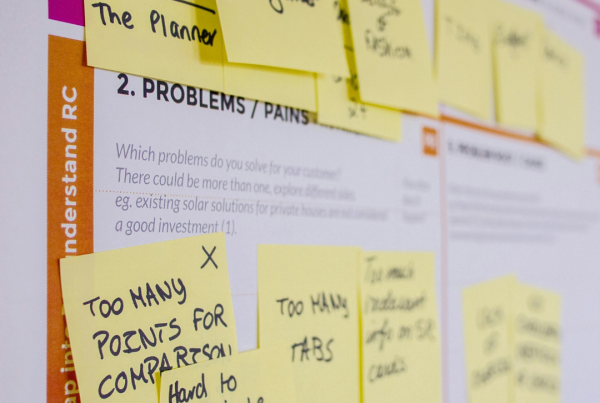Final part of ‘How to Build a Design Agency for Under $3K in 5 Years’
If there’s one guarantee in running your own business, it’s that you will be tested time and time again. Although startup founders tend to glorify or gloat about their early struggles, I can tell you that most of the time, it isn’t pretty.
In this wrap-up post for my series on how to build a design agency for under $3000, I’m going to write about the inevitable tests you will face as a business owner.
These are what I called the barriers everyone will face, especially when you try to build something from nothing. It’s the invisible stuff that few people talk about openly, the missing part in the instruction manual of building a business, or the lost steps in the recipe to success.
And overcoming it will be the difference between failure and triumph. It’s the difference between building a one-hit wonder and a sustainable business, between a fulfilling career and a stressful one.
Just like the three tests that Indiana Jones had to face in the last crusade, these are your rites of passage.
But don’t worry. Once you’ve been deep in the trenches for a while, you start to see these obstacles for what they are.
In fact, that’s what I call them: “One of those.”
When you see it for what it really is, as just another one of those tests and not a life altering crisis, you can look at the eye of the storm and walk through calmly.
Obstacle #1: Facing failure and rejection
This is a given when you are starting from scratch without any backing or reputation. No one is going to take you seriously or care much.
You’ll have to hustle, keep calm and grab opportunities as they come. And even after hitting it big, you will still meet your old friends called failure and rejection.
I call them friends because they make you and your business better. Without them, you’ll be stuck at the same spot 10 years from now, having learnt nothing and doing very little.
In the early days, you might start to wonder if you’re doing the right thing and whether your business has any value. You’ll have many deep conversations with yourself in your own head such as:
”“Why the hell am I doing this again? I’m not making anything and can’t see where it’s going. Maybe this is not for me”.
In my opinion, the two most important skills you need to master as a business owner are self-awareness and humility.
You need to understand your purpose, what’s realistic, what you’re good at and what you suck at to truly progress. To be self-aware, you need to have humility.
Self-awareness and humility go hand-in-hand and they are powerful skills that will help you overcome any failure and rejection.
Every time you make a mistake or face a rejection, your self-awareness and humility allow you to acknowledge it, learn from it and prevent you from making the same mistake twice.
Obstacle #2: Being swayed by money or the lack of it
Money is a funny thing. Too little and you’ll suffer. Too much and you’ll go crazy.
I’ve been on both ends of the spectrum while building and growing my business and here’s what I think.
It’s not about the money.
I hear you saying, “What? Don’t we need the money to survive?”
Yes, of course. However, throughout your business journey, money should not be the main or only reason.
Every time I’ve stressed myself out thinking about money in the past, it has never filled up my bank account or resolved my problems. But when I focus on my journey, what I’ve learnt and the value I can bring to my clients, my staff and the industry, money always appear out of nowhere — at the right time.
You may call it God, the universe or pure luck. But I think when you focus on solving a problem or providing a value, then money comes to you.
If you chase something, you may not have the stamina or strength to catch it. But if you attract it, it will eventually find its way to you.
Obstacle #3: Dealing with good and bad relations
Running a business is always about people, whether you like it or not. You will deal with staff, suppliers, contractors, customers, clients, and even down to the barista who makes your coffee every day.
There will be good people and there will be bad people. It’s life. But you, the business owner, need to learn how to deal with it, build good relationships and remove toxic ones. Because success in business comes down to how good you are with people and how good your reputation is.
So, what’s the key in building good relationships and how do you surround yourself with good people?
It’s quite simple. My mantra is, “Be kind to others and others will be kind to you”.
Genuine kindness is such a super trait to have. It’s so strong that it will bring you lots of wins in the future.
The more you put yourself out there, interact with individuals and take on challenges to work collaboratively, the more you will understand the meaning of empathy, which is another superpower business skill.
With empathy, you become aware of other people’s feelings. You can put yourself in other people’s shoes, understand how they feel and think to give you an insight into their decision-making process.
When mastered, it will allow you to almost manipulate situations, which is why I think empathy can be a double-edged sword. It’s why you need to balance it with kindness. When these two are balanced, you will flourish.
One of the most common positive feedback that we get at Relab is that we care for our customers and that we know what they need without much explanation. We just get it. I believe that’s all credit to our emphasis on practising empathy.
There’s one more important relationship in business but I won’t touch on that. It is between founders and co-founders. I never had a business partner, which I quite enjoy now though it does get lonely. But if you do it right, the rewards are worth fighting for alone.
Obstacle #4: Juggling work and life
At the time I’m writing this post, I have a 2.5 years old son.
He is, without a doubt, the best thing that has ever happened in our lives — my wife and me. However, the first year was the most chaotic period in our lives — so far.
As many parents will attest to, we had no idea what to expect when we became parents. We were clueless and probably still are. It was a shock to the system and we felt like an atom bomb just blew up in our house with the baby, on top of facing other personal challenges.
I had no idea how to juggle my two priorities. Running a business means you don’t get to clock off at 5 that often. My family needed me at home, but my young business needed me too.
Personally, I learnt a lot about myself during that period of chaos. I reflected a lot on what passion means. To me, it’s having a burning desire and drive to commit unconditionally to someone or something.
And with that, I realised that my family is my happiness and sits above everything else. Therefore, my business or work must support that fact, not only for the short term, but for the long run.
Amazon CEO Jeff Bezos talks about focusing on the concept of a work-life harmony, rather than chasing a work-life balance. A balance means you need to distribute equal amounts to all areas in your life, which can be impossible when you just started a business.
Harmony is when work and life falls into place and sync seamlessly, energising you every day.
To do this, you need self-discipline. Use your time wisely because you now have less time to do insignificant things that has no value to your long-term goal. In my case, I traded in the freedom to live life on my own terms so that I can give my best to my family and the people around me.
If you master this art of prioritising your day-to-day with self-discipline and apply your passion and focus to your long-term goal, you’ll be able to integrate your work and personal life just fine.
Although I’m continuously learning and refining, I think I have better control of my work and life now.
I can take a day off every month to take my wife out on a date. I’m also able to leave work early at least twice a week and drop off and pick up my son from childcare at least once a week.
And we can afford to go on family holidays abroad twice a year.
Finally, what’s the biggest lesson that I have learnt thus far in running my own design agency?
It’s that the truth always wins in the end. This ‘truth’ is just simply how the world works.
If you cheat and try to hack the system for short-term results, you’ll be stripped and exposed in the future. If you think you’re always the best, your clients and the market will shoot you down eventually. If you’re not nimble and fail to adapt to change, you can be obsolete.
These truths are brutal but are always right.
Learn to focus on your truths and passion — the reasons why you and your business exists. Practice humility and nurture your self-awareness. Be vigilant with your self-discipline, and never forget kindness and empathy in your life. Embrace the journey with patience, celebrate each milestone and always have gratitude.
With all these, you will not only reap the rewards, but I promise you will be happy with who you turn out to be.
In case you missed it, these are links to my previous posts in this series. Good luck in building your design agency.
Illustrations by: Irenne Tj
https://www.instagram.com/irennetj/
https://www.facebook.com/inspirationneverends/







